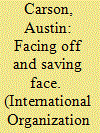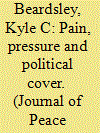| Srl | Item |
| 1 |
ID:
145011


|
|
|
|
|
| Summary/Abstract |
States pursue their cooperative and competitive goals using both public and private policy tools. Yet there is a profound mismatch between the depth, variety, and importance of covert activity and what scholars of International Relations (IR) know about it. This article addresses this gap by analyzing how adversaries struggle for influence within the covert sphere, why they often retreat to it, and when they abandon it. It focuses on secrecy among adversaries intervening in local conflicts and develops a theory about secrecy's utility as a device for creating sustainable limits in war. Drawing on insights about secrecy and face-work from the sociologist Erving Goffman, I show that major powers individually and collectively conceal evidence of foreign involvement when the danger of unintended conflict escalation is acute. Doing so creates a kind of “backstage” in which adversaries can exceed limits on war without stimulating hard-to-resist pressure to escalate further. An important payoff of the theory is making sense of puzzling cases of forbearance: even though adversaries often know about their opponent's covert activity, they often abstain from publicizing it. Such “tacit collusion” arises when both sides seek to manage escalation risks even as they compete for power and refuse to capitulate. The article evaluates the theory via several nested cases of external intervention in the Korean War. Drawing on newly available materials documenting the covert air war between secretly deployed Soviet pilots and Western forces, the cases show how adversaries can successfully limit war by concealing activity from outside audiences. Beyond highlighting the promise in studying the covert realm in world politics, the article has important implications for scholarship on coercive bargaining, reputation, state uses of secrecy, and how regime type influences conflict behavior.
|
|
|
|
|
|
|
|
|
|
|
|
|
|
|
|
| 2 |
ID:
098410


|
|
|
|
|
| Publication |
2010.
|
| Summary/Abstract |
This article explores the effect of domestic and international politics on the choice of mediation as a conflict management strategy in international crises. Existing work has yet to fully explore how domestic and international audiences shape the combatants' preferences for mediation. With regard to domestic pressures, combatants often desire mediation as political cover for unpalatable concessions. That is, intermediaries might obscure responsibility for disappointing outcomes or signal the prudence of compromise. In terms of international audiences, affected third parties eager to shape the resolution outcome might lobby to serve as a mediator. Since both domestic and international audiences are affected by the crisis severity, the article also explores how the pain of fighting conditions the effect of international and domestic political pressures. Empirical analysis of international crises since World War I confirms that potential domestic audience costs for seeking peace and the propensity for concessions positively affect the probability of mediation. Less clear is the role of third-party incentives; the results indicate that a higher potential for neighboring-state intervention actually decreases the likelihood of mediation. Consistent with previous studies, conflict costs increase mediation incidence, and the findings also indicate that at high costs of conflict, states appear in less need of political cover for making concessions.
|
|
|
|
|
|
|
|
|
|
|
|
|
|
|
|